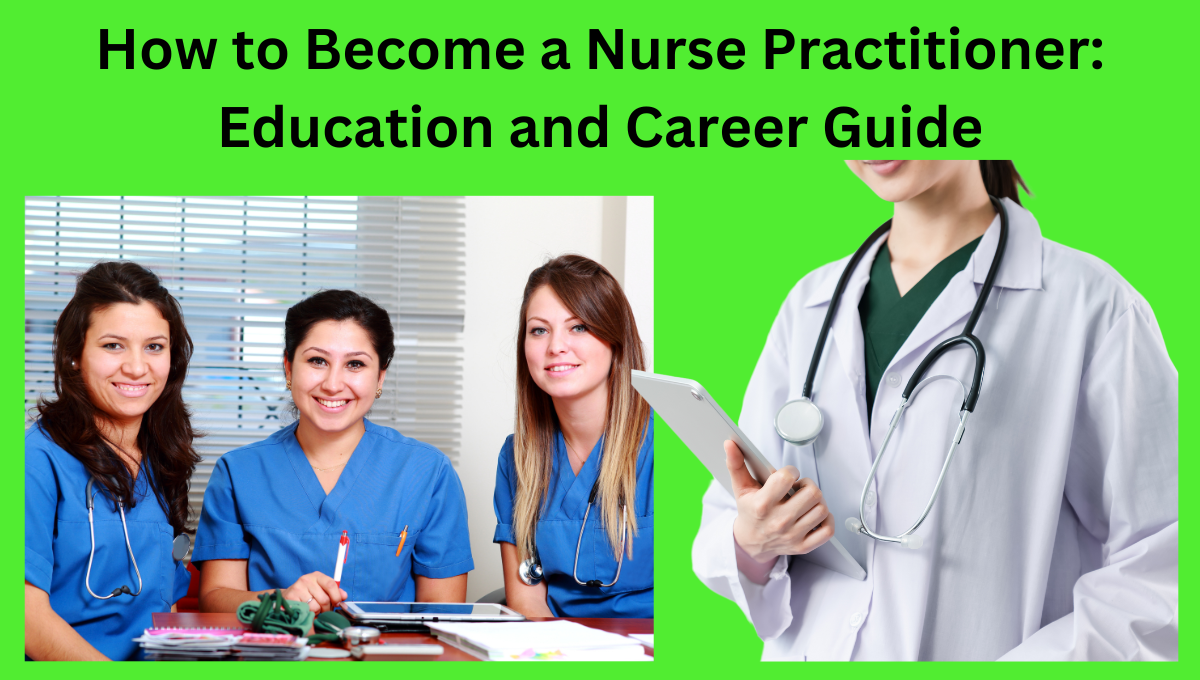How to Become a Nurse Practitioner: Education and Career Guide
Summary:
H1: Overview
A Nurse Practitioner (NP): What is it?
Nurse Practitioners’ Significance in Healthcare
Growing Interest in NPs
H2: Education Needed for Nurse Practitioner Certification
H3: Obtain a nursing bachelor’s degree (BSN)
BSN’s Function in Nursing Education
Selecting a Nursing Program with Accreditation
H3: Obtain a License as a Registered Nurse (RN)
How to Succeed on the NCLEX-RN Test
State Requirements for Licencing
H3: Acquire Clinical Knowledge
The Value of Practical Nursing Practice
Suggested Work Experience Prior to Further Education
H3: Get a nursing master’s or doctoral degree
Doctor of Nursing Practice (DNP) vs. Master of Science in Nursing (MSN)
Nurse Practitioner Specializations Available
Traditional vs. Online NP Programs
H2: Nurse Practitioner Certification and Licensure
H3: Exams for National NP Certification
Boards of Certification (AANP, ANCC, PNCB, etc.)
Getting Ready for the Certification Test
H3: State Requirements for Licensure
Comprehending NP Regulations Particular to Each State
How to Submit an NP License Application
H2: Nurse Practitioner Specializations and Career Routes
H3: Specialties of Primary Care Nurse Practitioners
FNP, or family nurse practitioner
Nurse Practitioner in Adult Gerontology (AGNP)
H3: Specialties of Acute Care Nurse Practitioners
ACNP stands for Acute Care Nurse Practitioner.
PACNP stands for Pediatric Acute Care Nurse Practitioner.
H3: Additional Specialized Domains
Nurse Practitioner in Psychiatric Mental Health (PMHNP)
Nurse Practitioner for Women’s Health (WHNP)
Nurse Practitioner for Neonatals (NNP)
H2: Employment Prospects and Professional Development
H3: Nurse Practitioners’ Workplaces?
Clinics, Private Practices, and Hospitals
Roles of Telehealth and Remote Healthcare
H3: NPs’ Pay and Employment Prospects
Average Pay for Various Specialties
Forecasted Increase in NP Employment
H2: Difficulties and Benefits of Nurse Practitioner Work
H3: Typical Obstacles NPs Face
Excessive workload and burnout
Restrictions on the Scope of Practice in Certain States
H3: The Benefits of a Career as an NP
Capacity to Offer Complete Patient Care
High levels of career stability and job satisfaction
H2: Advice for Nurse Practitioners in Training
Selecting the Appropriate NP Program
Professional Organizations and Networking
Maintaining Current Knowledge through Continuing Education
H2: Summary
An Overview of the Procedures for Becoming a Nurse Practitioner
Motivation for Upcoming NPs
H2: Common Questions
What is the duration required to become a nurse practitioner?
Can someone without a BSN become a nurse practitioner?
What distinguishes a physician assistant (PA) from a nurse practitioner (NP)?
Are NP programs offered online reliable?
Which NP specialty has the greatest salaries?
How to Become a Nurse Practitioner: Education and Career Guide

Overview
For registered nurses (RNs) who wish to diagnose conditions, prescribe drugs, enhance healthcare access, and assume greater responsibility in patient care, becoming a nurse practitioner (NP) is a great career choice. NPs are helping to close the gap between patients and high-quality medical treatment as the need for healthcare professionals grows. This guide will walk you through the necessary coursework, license, career options, and potential obstacles if you’re thinking about becoming a nurse practitioner.
What You Need to Learn to Become a Nurse Practitioner
Obtain a nursing bachelor’s degree (BSN).
Earning a Bachelor of Science in Nursing (BSN) degree from an approved nursing program is the first requirement for becoming a nurse practitioner. Many NP programs demand a BSN for enrollment, even though some people join nursing with an Associate Degree in Nursing (ADN).
Obtain a license as a registered nurse (RN).
To become a licensed registered nurse after earning a BSN, you must pass the National Council Licensure Examination for Registered Nurses, or NCLEX-RN. This test evaluates your capacity to deliver nursing care in a safe and efficient manner.
Acquire Experience in Clinical Settings
Prior to applying to most NP programs, candidates must have at least one to two years of clinical experience as a registered nurse. Getting practical experience in a range of healthcare environments will help you get ready for the more complex duties of an NP.
Get a nursing master’s or doctoral degree.
Either a Master of Science in Nursing (MSN) or a Doctor of Nursing Practice (DNP) must be earned in order to work as an NP. DNP programs, which concentrate on nursing leadership and research, last three to five years, whereas MSN programs last two to three years.
Nurse Practitioner Certification and Licensure
You need to pass a national certification exam administered by one of the following organizations in order to work as an NP:
Nurse Practitioners’ American Academy (AANP)
ANCC stands for American Nurses Credentialing Center.
The PNCB, or Pediatric Nursing Certification Board
You also need to fulfill the licensing standards set forth by your state, which can differ. While some states restrict NPs’ scope of practice, others grant them complete practice authority.
Career Paths and Specializations for Nurse Practitioners
Depending on their interests, NPs can specialize in a number of areas, such as:
Primary care for patients of all ages is provided by family nurse practitioners (FNPs).
The focus of an adult-gerontology nurse practitioner (AGNP) is on caring for the elderly and adults.
Mental health diagnosis and treatment are provided by Psychiatric Mental Health Nurse Practitioners (PMHNPs).
Women’s reproductive health is the primary focus of women’s health nurse practitioners (WHNPs).
Employment Prospects and Professional Development
Nurse practitioners are employed in a variety of healthcare environments, including
Emergency rooms and hospitals
Doctor’s offices and private clinics
Services for Telehealth
Rehab facilities and nursing homes
NPs often make between $100,000 and $140,000, depending on their region and area of expertise. By 2032, the need for NPs is predicted to increase by 40%, making it one of the healthcare professions with the quickest rate of growth.
In conclusion
The path to becoming a nurse practitioner is a fulfilling one that calls for commitment, study, and clinical experience. NPs can enhance patient outcomes, deliver high-quality treatment, and have a rewarding profession with the correct education and certification. A career as an NP is a fantastic option if you have a strong desire to improve healthcare.
FAQs
What is the duration required to become a nurse practitioner?
6–8 years on average, combining clinical and educational experience.
Can someone without a BSN become a nurse practitioner?
While most schools need a BSN, some provide RN-to-MSN pathways.
How do NPs and PAs differ from one another?
While PAs adhere to a medical model akin to that of physicians, NPs concentrate on patient-centered treatment.
Are NP programs offered online reliable?
Yes, provided they are accredited and fulfill the standards for state licensure.
Which NP specialty has the greatest salaries?
The greatest wages are frequently earned by psychiatric, acute care, and neonatal NPs.


2 thoughts on “How to Become a Nurse Practitioner: Education and Career Guide”